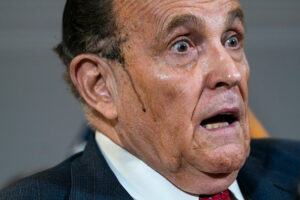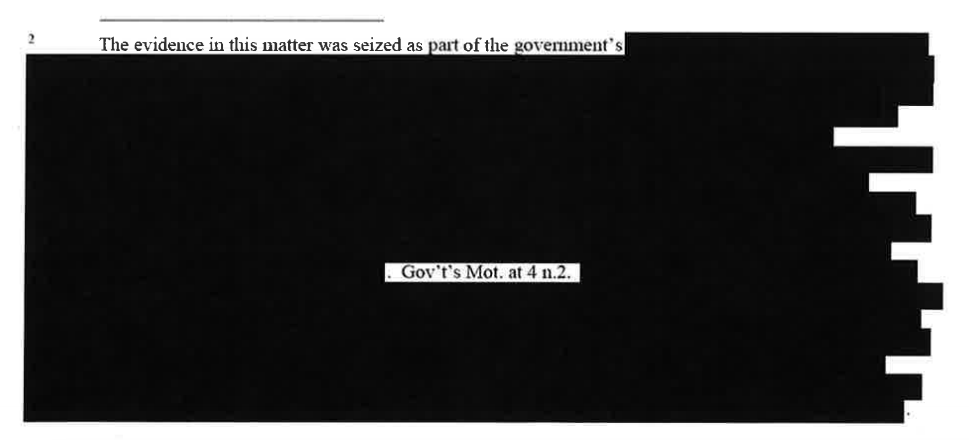
A completely unrelated picture. (Photo by Drew Angerer/Getty Images)
The president is reportedly contemplating granting pardons to three of his kids, his lawyer, and even to himself. Not because they did anything wrong, of course, but just as a nice parting gift.
Everyone else has to buy one at the White House gift shop, though. ALLEGEDLY.
Last night CNN was first to note an interesting filing on the docket of the U.S. District Court in D.C., where Chief Judge Beryl A. Howell unsealed an August 28 order involving to a scheme to pay a bribe in exchange for a presidential pardon.
The order pertains to a search warrant executed on two offices during which the government discovered:
[O]ver fifty digital media devices, including iPhones, iPads, laptops, thumb drives, and computer and external hard drives … (totaling several terabytes of data)” seized, email communications have been identified “indicat[ing] additional criminal activity” namely: (1) a “secret lobbying scheme” … in which [redacted] and [redacted] acted as lobbyists to senior White House officials without complying with the requirements of the Lobbying Disclosure Act (“LDA”), 2 U.S.C. §§ 1601 et seq., to secure “a pardon or reprieve of sentence for [redacted] … and (2) a related bribery conspiracy scheme, in which “[redacted] would offer a substantial political contribution in exchange for a presidential pardon or reprieve of sentence for [redacted],” using [extremely long redaction] “as the intermediaries to deliver the proposed bribe.”
The feds weren’t looking for a bribes-for-pardon scheme when they went in. They were after … something else.

How Legisway Helps In-House Teams Manage All Legal Matters In One Trusted Place
Operate with AI driven insights, legal intake, unified content and modular scalability to transform efficiency and clarity.

What they found, though, was evidence that the alleged briber, who was at some point in the custody of the Bureau of Prisons, sought clemency from the president based on “past substantial campaign contributions” and “anticipated future substantial political contributions.” Which is an unorthodox basis for discretionary relief.
Most of the filing is redacted, but it seems a safe bet that at least one of the parties whose office was raided was a lawyer. Multiple players appear to be attorneys, and the court goes to great length trying to match clients to counsel and determine which parties are in privity.

The government cited the crime-fraud exception and/or the presence of third parties in its motion seeking access to attorney communications seized in the raid. And Judge Howell agreed, holding that “notwithstanding the attorney-client relationship that [redacted] may have had with either [redacted] or [redacted], any communication related to the alleged LDA or Bribery-for-pardon schemes between or among those individuals, in which communications [redacted] was a participant or otherwise a recipient, is not protected by the attorney-client or any other privilege and is therefore reviewable by the government’s investigation team.”
Where the court departed ways with the government, however, was on keeping the matter sealed from the public. On August 28, Judge Howell gave the DOJ 90 days to prepare a report on which portions of the order could be unredacted. On November 25, the government handed in a very short reply: none. But the court was unconvinced that the entire matter had to remain under seal simply because it referred to parties who haven’t been charged by a grand jury, which brings us to last night when this highly redacted version wound up on the public docket.
Obviously the filing leaves us with a lot more questions than answers, but we do know a few important details: We know that in involves someone who wound up in federal custody after making substantial contributions to a political campaign. We know that he or she has a complicated relationship with a lawyer who has access to the White House — sometimes that lawyer is the attorney, sometimes he’s not. And we know that Bill Barr’s Justice Department has gone to the mat to keep this case under wraps during the election.
In perhaps totally unrelated news, Rudy Giuliani’s buddies Lev Parnas and Igor Fruman were indicted in October of 2019 for making an illegal strawman donation of $325,000 to Donald Trump’s campaign PAC. Giuliani was paid $500,000 by Parnas and Fruman to consult for their company “Fraud Guarantee”, but Giuliani also claimed to have employed them in his work for the president trying to dig up dirt on Joe Biden in Ukraine. When Parnas was arrested, he even attempted to assert executive privilege, claiming to fall under the magical Trump-Rudy Omnibus Privilege Umbrella. And the government added charges to Parnas’s ticket three weeks after Judge Howell gave the DOJ the greenlight to access those disputed comms.
Anyway, it’s probably just a bunch of coincidences. Carry on.
Order [In the Matter of the Search of the Premises Known as the Office of REDACTED and the Office of REDACTED, No. 20-gj-35-BAH (D.D.C. Dec. 1, 2020)]
Elizabeth Dye lives in Baltimore where she writes about law and politics.